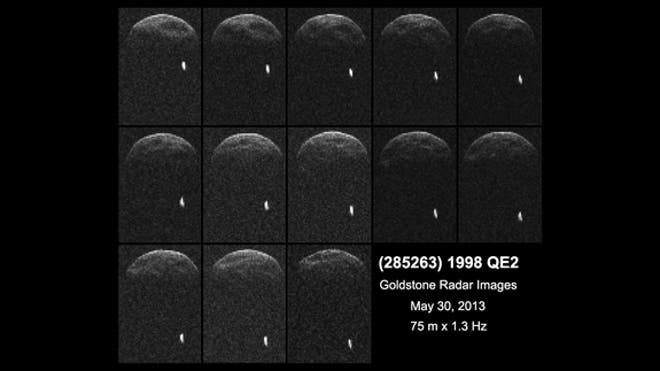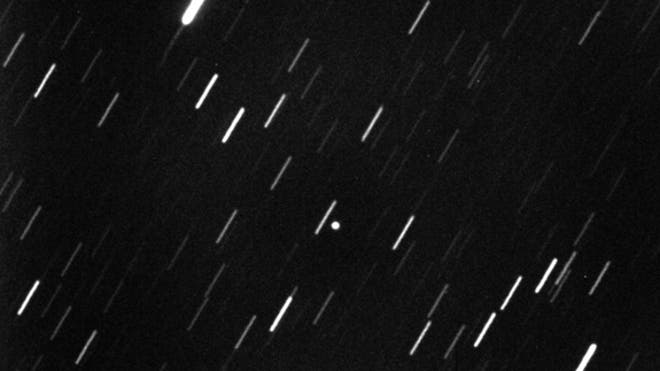| A huge asteroid is set to cruise by Earth Friday afternoon, making its closest approach to our planet for at least the next two centuries. Asteroid 1998 QE2 will come within 3.6 million miles of Earth at 4:59 p.m. EDT (2059 GMT) Friday — about 15 times the distance from our planet to the moon. There's no chance the 1.7-mile-wide 1998 QE2 will hit us, researchers say. That's a good thing, because a strike by such a big space rock would cause catastrophic damage, potentially wiping out our species. [Potentially Dangerous Asteroids (Images)]
- Astronomy magazine columnist Bob Berman In general, scientists think any asteroid bigger than 0.6 miles could end human civilization if it hit us. For comparison, the object that killed off the dinosaurs 65 million years ago is thought to have been about 6 miles wide. Asteroid 1998 QE2 won't put on a show for skywatchers. At its closest pass, the space rock will still be 100 times fainter than the dimmest star visible to naked-eye observers under clear and dark skies, experts say. But several different organizations, including the Slooh Space Telescope and the Virtual Telescope Project, will broadcast live views of the near-Earth asteroid's close approach from professional-quality observatories around the world. You can watch it live right here at FoxNews.com, starting at 4:30 p.m. EDT (2030 GMT). "It will be fun to actually watch it change position," Astronomy magazine columnist Bob Berman, who will participate in Slooh's show, said in a statement. "As Slooh's Space Cameras image it directly [Friday] afternoon, we will all be reminded that asteroids of this size have changed the biosphere of our planet in the past, and even set the stage for the present dominion of humans." Scientists are already watching 1998 QE2 closely, in an attempt to learn more about the asteroid's characteristics and orbit. A team of radio astronomers using NASA's Deep Space Network antenna at Goldstone, Calif., for example, just learned that the asteroid is actually a binary system, with a 2,000-foot-wide moon circling the larger space rock. Researchers plan to use the Goldstone facility as well as the huge Arecibo Observatory in Puerto Rico to watch 1998 QE2 through June 9, NASA officials said. Asteroid 1998 QE2 was first spotted in August 1998 by astronomers working with MIT's Lincoln Near Earth Asteroid Research program in New Mexico. The space rock's name is not an homage to England's Queen Elizabeth II, or to the famous ocean liner. Rather, it's just the moniker assigned under the established alphanumeric scheme that lays out when asteroids are discovered. The approaching 1998 QE2 is part of a near-Earth population that likely numbers in the millions. To date, just 10,000 of these relatively close-flying space rocks have been discovered. via Science - Google News http://news.google.com/news/url?sa=t&fd=R&usg=AFQjCNEWYtUBFnZI7HrRri8Y4Q_kPi_htg&url=http://www.foxnews.com/science/2013/05/31/giant-asteroid-to-sail-past-earth-today-watch-it-live/ | |||
| | |||
| | |||
|
Home »Unlabelled » Giant asteroid to sails past Earth - Fox News
Friday, 31 May 2013
Giant asteroid to sails past Earth - Fox News
Debarjun Saha | 15:47 |
Subscribe to:
Post Comments (Atom)
Search
#
Popular Posts
-
PTI : Washington, Tue Oct 01 2013, 15:42 hrs < img src="http://static.indianexpress.com/m-image...
-
The High Altitude Venus Operational Concept program would eventually send a manned mission to the atmosp...
-
The same day that Amazon announced a trial run of its delivery by drone service in India , a couple of MIT...
-
http://aggressiveseiag.cryptoumoneybox.cn
-
Biologist Vladimir Dinets spent years studying the behaviour of crocodiles He saw crocodiles pushing ...
-
https://cryptstonener.com/5?kjBhVgFCcgd*grfhGVjhbNJNHGBVTFrDCRT*tfRcgH
-
First private DNA forensic lab in India's ...
-
Hi there! I regret to inform you about some sad news for you. Approximately a month or two ago I have succeeded to gain a total access t...
-
Hi! Sadly, there are some bad news that you are about to hear. About few months ago I have gained a full access to all devices used by y...
-
Redirect Notice Redirect Notice The previous page is se...



No comments:
Post a Comment